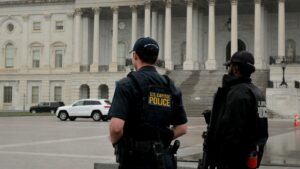
Among the thousands of layoffs at the U.S. Department of Health and Human Services this week were many staff who handled public records requests under the Freedom of Information Act.Kayla Bartkowski/Getty Images
The U.S. Department of Health and Human Services has seen significant staff reductions, impacting teams responsible for managing Freedom of Information Act (FOIA) requests. The cuts are part of a broader 10,000-person reduction within the Trump administration.
Entire teams at prominent agencies, including the Centers for Disease Control and Prevention, the Food and Drug Administration, and the National Institutes of Health, have been affected. Only a handful of staff in some FOIA teams remain, according to insiders who spoke anonymously due to fear of reprisal.
Despite Health Secretary Robert F. Kennedy Jr.’s pledge of “radical transparency,” some experts, like Jason R. Baron, argue that these layoffs contradict that promise. Baron anticipates that the reduced staffing will lead to increased delays and backlogs in handling public records requests.
Baron emphasizes, “They are the American people’s records, and there should be adequate FOIA staff to make sure that record requests are answered promptly.” Reducing staff is seen as counterproductive to transparency.
The Department of Health and Human Services responded to inquiries, stating that the FOIA offices were previously isolated and will now be streamlined under Secretary Kennedy’s initiative for a more efficient department.
The Freedom of Information Act was enacted to enhance government transparency, allowing public access to federal agency records. These requests can include important documents such as drug safety data or agency communications, and are often used by journalists to uncover government operations.
Recently, NPR used FOIA to reveal details of the government’s $5.3 billion contract for Paxlovid in 2021, including certain unexpected aspects of the deal (read more).
Gunita Singh, an attorney at the Reporters Committee for Freedom of the Press, expressed concern over the layoffs, stating, “Why anyone would think putting transparency on the chopping block is a good idea is beyond me.”
Singh noted that the staff cuts are already affecting ongoing FOIA litigation, which she describes as “devastating.” She warns that the layoffs will hinder access to information and delay the release of records that the public and press are entitled to by law.
She highlighted that FOIA offices were already understaffed, leading to challenges in meeting the 20-day response mandate, and these recent cuts will only worsen the situation.
In a research paper, Singh and a colleague discussed how the FBI’s FOIA office shutdown during COVID made it more difficult to process requests, even after reopening (read more).
Baron predicts that HHS will face increased litigation and heightened scrutiny over adherence to public records laws. “HHS may be able to fire FOIA staff, but this Administration can’t wish away its FOIA obligations under present law,” he asserts.
Rob Stein and Selena Simmons-Duffin contributed to this report.






